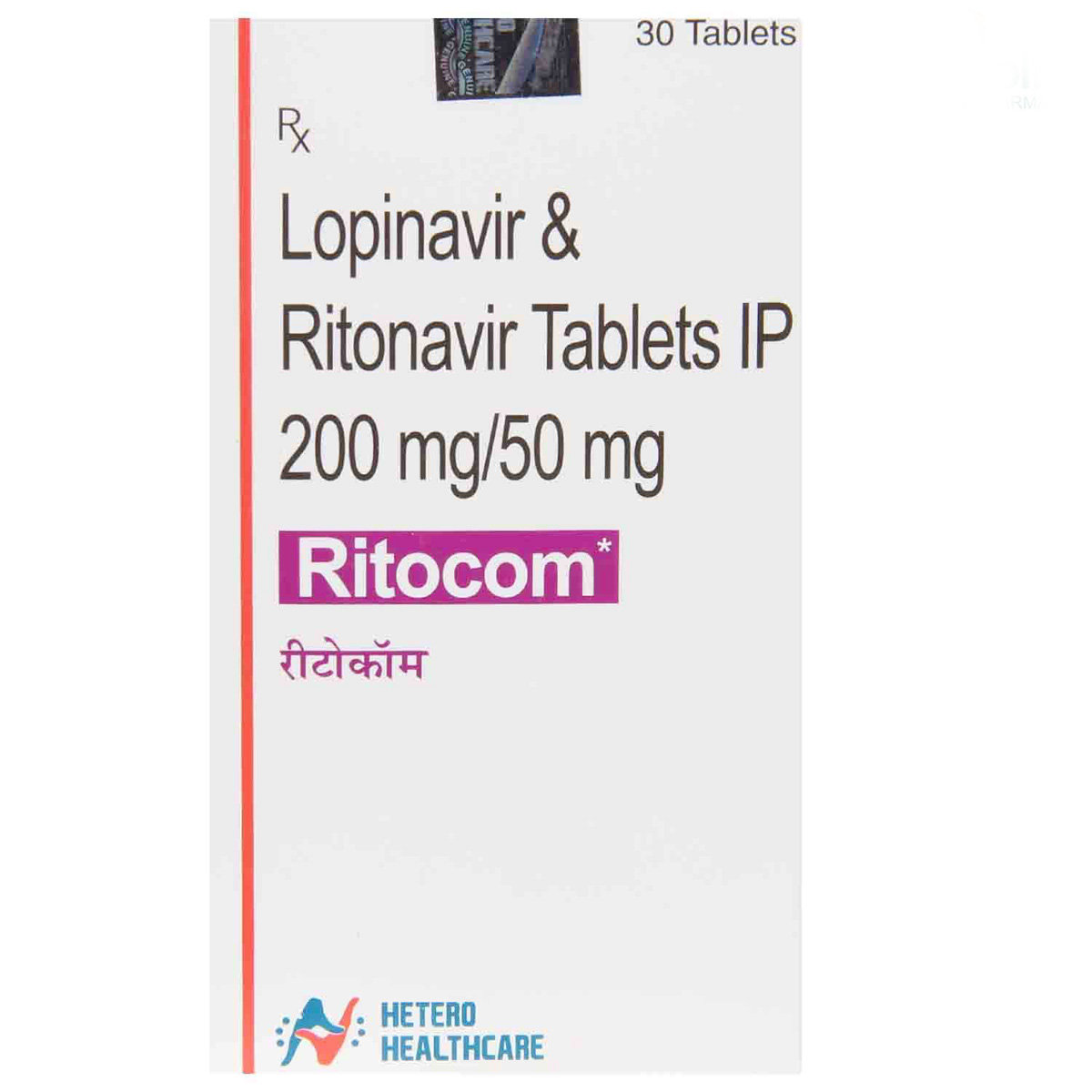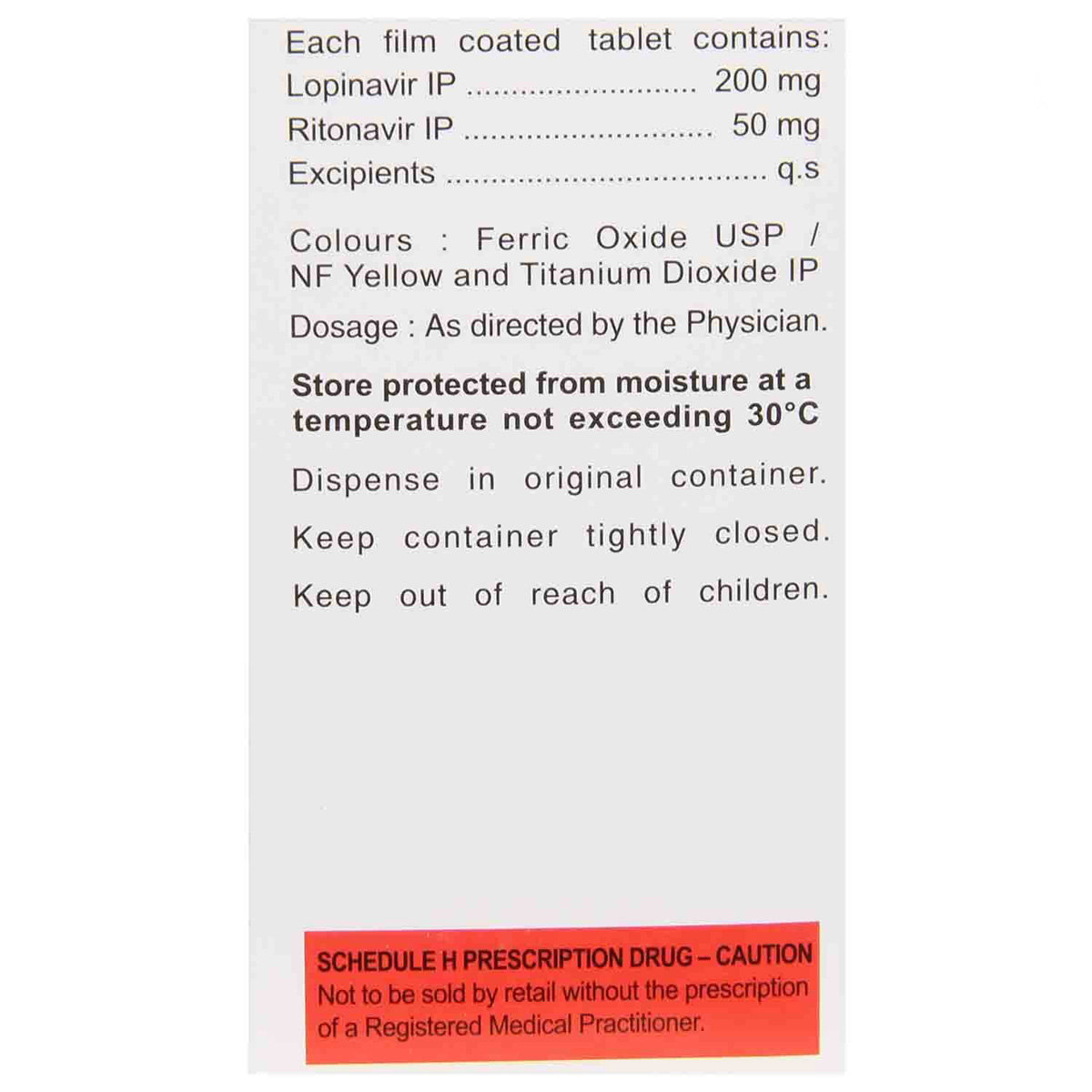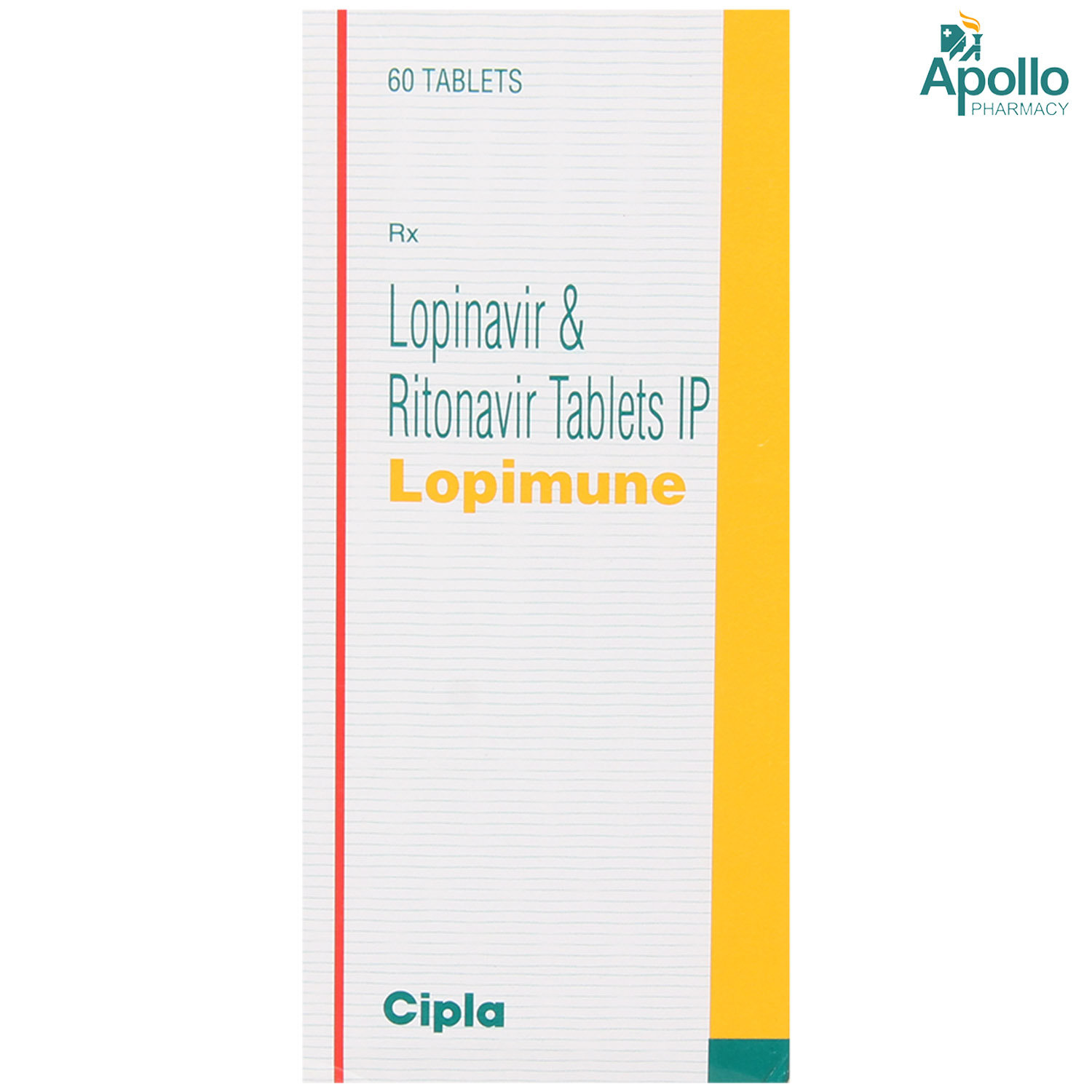Ritocom Tablet 30's
MRP ₹1510.5
(Inclusive of all Taxes)
₹226.6 Cashback (15%)
Provide Delivery Location
Online payment accepted
 Prescription drug
Prescription drugWhats That
Composition :
Manufacturer/Marketer :
Consume Type :
Expires on or after :
Return Policy :
About Ritocom Tablet
Ritocom Tablet belongs to a class of drugs called antiretrovirals used in the treatment of HIV infection. Ritocom Tablet helps in decreasing the chance of developing AIDS (acquired immunodeficiency syndrome). Ritocom Tablet may be used in combination with other antiviral drugs. HIV (Human Immunodeficiency Virus) is a virus that attacks the immune system and destroys the white blood cells that help in fighting infection, making the individual susceptible to other infections or illnesses.
Ritocom Tablet is a combination of two antiretroviral drugs, namely: Lopinavir and Ritonavir. Lopinavir works by inhibiting the working of a protease enzyme that is essential for the reproduction of HIV. Thereby, it prevents the production of the new virus. Ritonavir slows the breakdown of Lopinavir by the liver and increases the levels of Lopinavir in the blood and making it effective against the virus. Together, they help to control HIV infection.
Take Ritocom Tablet as prescribed by your doctor. You are advised to take Ritocom Tablet for as long as your doctor has prescribed it for you based on your medical condition. In some cases, you may experience nausea, vomiting, diarrhea, upper respiratory tract infection, indigestion, decreased appetite, headache, or dizziness. Most of these side effects of Ritocom Tablet do not require medical attention and gradually resolve over time. However, if the side effects persist or worsen, please consult your doctor.
If you are allergic to Ritocom Tablet or any other medicines, please tell your doctor. Ritocom Tablet is not recommended for children below 2 years of age as the safety and effectiveness were not established. If you are pregnant, planning for pregnancy, or breastfeeding, please consult a doctor before taking Ritocom Tablet . You are recommended to avoid the consumption of alcohol with Ritocom Tablet as it may increase the risk of liver damage. Drive only if you are alert as Ritocom Tablet may cause dizziness.
Uses of Ritocom Tablet
Directions for Use
Key Benefits
Ritocom Tablet contains Lopinavir and Ritonavir used in the treatment of HIV infection. Ritocom Tablet may be used in combination with other antiviral drugs. Lopinavir inhibits the working of the protease enzyme that is essential for the reproduction of HIV. Thereby, it prevents the production of the new virus. Ritonavir slows the breakdown of Lopinavir by the liver and increases the levels of Lopinavir in the blood and making it effective against the virus. Together, they help to control HIV infection by slowing the spread of infection in the body. Taking Ritocom Tablet along with practicing safe sex and lifestyle changes may reduce the risk of getting or transmitting HIV to others.
Storage
- Inform Your Doctor: Notify your doctor immediately about your diarrhoea symptoms. This allows them to adjust your medication or provide guidance on managing side effects.
- Stay Hydrated: Drink plenty of fluids to replace lost water and electrolytes. Choose water, clear broth, and electrolyte-rich drinks. Avoid carbonated or caffeinated beverages to effectively rehydrate your body.
- Follow a Bland Diet: Eat easy-to-digest foods to help firm up your stool and settle your stomach. Try incorporating bananas, rice, applesauce, toast, plain crackers, and boiled vegetables into your diet.
- Avoid Trigger Foods: Steer clear of foods that can worsen diarrhoea, such as spicy, fatty, or greasy foods, high-fibre foods, and dairy products (especially if you're lactose intolerant).
- Practice Good Hygiene: Maintain good hygiene to prevent the spread of infection. To stay healthy, wash your hands frequently, clean and disinfect surfaces regularly, and avoid exchanging personal belongings with others.
- Take Anti-Diarrheal Medications: If your doctor advises, anti-diarrheal medications such as loperamide might help manage diarrhoea symptoms. Always follow your doctor's directions.
- Keep track of your diarrhoea symptoms. If they don't get better or worse or are accompanied by severe stomach pain, blood, or dehydration signs (like extreme thirst or dark urine), seek medical help.
- Inform your doctor about the nausea and discuss possible alternatives to the medication or adjustments to the dosage.
- Divide your daily food intake into smaller, more frequent meals to reduce nausea.
- Opt for bland, easily digestible foods like crackers, toast, plain rice, bananas, and applesauce.
- Avoid certain foods that can trigger nausea, such as fatty, greasy, spicy, and smelly foods.
- Drink plenty of fluids, such as water, clear broth, or electrolyte-rich beverages like coconut water or sports drinks.
- Use ginger (tea, ale, or candies) to help relieve nausea.
- Get adequate rest and also avoid strenuous activities that can worsen nausea.
- Talk to your doctor about taking anti-nausea medication if your nausea is severe.
- Record when your nausea occurs, what triggers it, and what provides relief to help you identify patterns and manage your symptoms more effectively.
- Preventing Vomiting (Before it Happens)
- Take medication exactly as prescribed by your doctor. This can help minimize side effects, including vomiting.
- Having a small meal before taking your medication can help reduce nausea and vomiting.
- Talk to your doctor about taking anti-nausea medication along with your prescribed medication.
- Managing Vomiting (If it Happens)
- Try taking ginger in the form of tea, ale, or candy to help alleviate nausea and vomiting.
- What to Do if Vomiting Persists
- Consult your doctor if vomiting continues or worsens, consult the doctor for guidance on adjusting your medication or additional treatment.
Drug Warnings
If you are allergic to Ritocom Tablet or any other medicines, please tell your doctor. Ritocom Tablet is not recommended for children below 2 years of age as the safety and effectiveness were not established. If you are pregnant or planning for pregnancy, please consult a doctor before taking Ritocom Tablet . HIV-infected women are recommended to avoid breastfeeding as the baby may be infected through breast milk. Please consult a doctor if you are breastfeeding before taking Ritocom Tablet . You are recommended to avoid consumption of alcohol with Ritocom Tablet as it may increase the risk of liver damage. Drive only if you are alert as Ritocom Tablet may cause dizziness. You are advised to take proper precautions if you are infected with HIV infection to prevent the spread of infection to others through sexual contact or body fluids. If you experience stomach pain, difficulty in breathing, vomiting, nausea and severe weakness in the muscles of arms and legs, please consult a doctor immediately as these might be symptoms of increased lactic acid levels.
Drug-Drug Interactions
Drug-Drug Interactions
Login/Sign Up
When Lovastatin is taken with Ritocom Tablet, it may increase the risk of side effects such as liver damage.
How to manage the interaction:
Taking Ritocom Tablet and Lovastatin not recommended as it can possibly result in an interaction, it can be taken if your doctor has advised it. If you notice any of these symptoms like muscle pain, tenderness, or weakness fever, chills, joint pain or swelling, unusual bleeding or bruising, skin rash, itching, loss of hunger, fatigue, nausea, vomiting, dark colored urine, and/or yellowing of the skin or eyes contact a doctor. Do not discontinue any medications without consulting a doctor.
Taking Isavuconazole with Ritocom Tablet may significantly increase the blood levels of Isavuconazole, which may increase the risk of side effects.
How to manage the interaction:
Taking Isavuconazole with Ritocom Tablet is not recommended as it can possibly result in an interaction, it can be taken if a doctor has advised it. If you notice any of these symptoms like nausea, vomiting, loose stools, light color stools or dark urine, consult a doctor. Do not discontinue any medications without consulting a doctor.
Taking Ritocom Tablet and primidone may decrease the blood levels of Ritocom Tablet.
How to manage the interaction:
Taking Primidone with Ritocom Tablet is not recommended as it can possibly result in an interaction, it can be taken if your doctor has advised it. However, if you experience any unusual symptoms, contact a doctor immediately. Do not discontinue any medications without consulting a doctor.
Taking Ritocom Tablet and Ranolazine may significantly increase the blood levels and effects of Ranolazine.
How to manage the interaction:
Co-administration of Ranolazine with Ritocom Tablet can possibly result in an interaction, but it can be taken if a doctor has advised it. In case you experience any symptoms like feeling lightheaded, fainting, or rapid heartbeats, consult a doctor. Do not stop using any medications without a doctor's advice.
Coadministration of Ritocom Tablet and Sildenafil may significantly increase the blood levels of sildenafil.
How to manage the interaction:
Taking Sildenafil with Ritocom Tablet together is generally avoided as it can possibly result in an interaction, it can be taken only if your doctor has advised it. If you notice any of these symptoms like nausea, shortness of breath, dizziness, lightheadedness, fainting, visual disturbances, ringing in the ears, vision or hearing loss, chest pain or tightness, irregular heartbeat, and/or priapism (prolonged and painful erection unrelated to sexual activity), contact a doctor. Do not discontinue any medications without consulting a doctor.
When Voriconazole is taken with Ritocom Tablet, the amount of Voriconazole in the blood may decrease.
How to manage the interaction:
Taking Voriconazole with Ritocom Tablet is not recommended as it can result in an interaction, it can be taken if your doctor has advised it. However, if you notice any unusual symptoms contact a doctor immediately. Do not discontinue any medications without consulting a doctor.
Taking Phenobarbital with Ritocom Tablet may significantly reduce the blood levels of Ritocom Tablet.
How to manage the interaction:
Taking Phenobarbital with Ritocom Tablet is not recommended as it can result in an interaction, it can be taken if a doctor has advised it. If you notice any unusual symptoms consult a doctor immediately. Do not discontinue any medications without consulting a doctor.
Taking Ticagrelor with Ritocom Tablet may significantly increase the blood levels of Ticagrelor.
How to manage the interaction:
Taking Ticagrelor with Ritocom Tablet is not recommended, but it can be taken together if prescribed by a doctor. However, consult your doctor if you experience any unusual bleeding or bruising, swelling, vomiting, blood in your urine or stools, headache, dizziness, or weakness. Do not discontinue any medications without consulting a doctor.
Coadministration of Flecainide with Ritocom Tablet can increase the risk of irregular heart rhythms.
How to manage the interaction:
Taking Flecainide with Ritocom Tablet is generally avoided, it can be taken if prescribed by a doctor. However, if you experience any unusual symptoms like chest tightness, dizziness, shortness of breath, or weakness, contact a doctor immediately. Do not discontinue any medications without consulting a doctor.
Coadministration of Silodosin with Ritocom Tablet can significantly increase the blood levels and effects of Silodosin, and this may cause low blood pressure and increase heart rate, especially when you rise from a sitting or lying position.
How to manage the interaction:
Taking Ritocom Tablet and Silodosin together is not recommended, but it can be taken if prescribed by a doctor. If you notice any of these signs - like dizziness, lightheadedness, fainting, headache, flushing, nasal congestion, heart palpitation-call a doctor right away. Do not stop using any medications without a doctor's advice.
Drug-Food Interactions
Drug-Food Interactions
Login/Sign Up
St. John’S Wort
How to manage the interaction:
Co-administration of Ritocom Tablet with St. John's Wort may impair virologic effectiveness (failure to meet a specific target of antiviral drug treatment) and lower the blood levels of ritonavir & lopinavir. Avoid taking St. John's Wort with Ritocom Tablet as this can lower the blood levels of ritonavir & lopinavir.
Diet & Lifestyle Advise
- Practise safe sex by using condoms; it helps in reducing contact with semen and vaginal fluids.
- Never share personal items with body fluids or blood on them, such as razor blades or toothbrushes.
- Avoid sharing used needles, other injections, or drug equipment.
- Get tested for other sexually transmitted infections such as gonorrhea or syphilis as they can make you prone to HIV infection.
- Eat a healthy and balanced diet. Eat vitamin and nutrient-rich food such as dark green, yellow, orange, and red vegetables and fruits as it helps to boost your immune system. Opt for lean protein and whole grains.
- Avoid eating raw meat and eggs. Consume properly boiled and cooked meat, poultry, or seafood.
- Eat bland and low-fat foods and avoid spicy or oily foods if you experience nausea or vomiting.
- Try to reduce emotional and physical stress by spending time with family or doing whatever makes you happy.
Side Effects of Ritocom Tablet
- Nausea
- Vomiting
- Diarrhoea
- Upper respiratory tract infection
- Indigestion
- Decreased appetite
- Headache
- Dizziness
Habit Forming
Therapeutic Class
All Substitutes & Brand Comparisons
RX
Out of StockAluvia 200 mg/50 mg Tablet 120's
Abbott India Ltd
₹48.3
(₹0.4 per unit)
99% CHEAPERRX
Out of StockAlltera 200/50 mg Tablet 120's
Mylan Pharmaceuticals Pvt Ltd
₹4691
(₹32.06 per unit)
29% CHEAPERRX
Out of StockRitoford 50mg/200mg Tablet
Johnlee Pharmaceuticals Pvt Ltd
₹2716.52
(₹37.13 per unit)
18% CHEAPER
Author Details
We provide you with authentic, trustworthy and relevant information
Drug-Diseases Interactions
Drug-Diseases Interactions
Login/Sign Up
FAQs
Drug-Drug Interactions Checker List
- ASTEMIZOLE
- TERFENADINE
- TRIAZOLAM
- MIDAZOLAM
- QUETIAPINE
- PIMOZIDE
- LURASIDONE
- SIMVASTATIN
- LOVASTATIN
- FUSIDIC ACID
- SILDENAFIL
- VARDENAFIL
- AVANAFIL
- CISAPRIDE
- DRONEDARONE
- AMIODARONE
- DIHYDROERGOTAMINE
- METHYLERGONOVINE
- ERGOTAMINE
- ERGONOVINE
Special Advise
Certain tests are recommended while taking Ritocom Tablet to monitor the changes in levels of blood lipids and glucose.
Disease/Condition Glossary
HIV infection: HIV (Human Immunodeficiency Virus) is a virus that attacks the immune system and destroys the white blood cells that help in fighting infection, making the individual susceptible to other infections or illnesses. People with HIV experience flu-like symptoms such as fever, chills, rash, night sweats, muscle aches, tiredness, and sore throat. These symptoms usually last for days to several weeks. HIV spreads through body fluids such as semen, vaginal fluid, and blood. If left untreated, this condition can lead to AIDS (Acquired Immunodeficiency Syndrome). It is a life-long condition, and there is no definite cure for it. However, it can be controlled by treating with antiretroviral drugs.

Have a query?
Alcohol
Safe if prescribed
Avoid alcohol consumption with Ritocom Tablet as it may increase the risk of liver damage.
Pregnancy
Consult your doctor
Ritocom Tablet is given to pregnant women only if the doctor thinks benefits outweigh risks. Please consult a doctor if you are pregnant or planning for pregnancy.
Breast Feeding
Consult your doctor
Breastfeeding mothers are not recommended to take Ritocom Tablet unless advised by a doctor. Therefore, please consult a doctor if you are breastfeeding.
Driving
Safe if prescribed
Ritocom Tablet may cause dizziness in some people. Therefore, avoid driving or operating heavy machinery if you feel dizzy after taking Ritocom Tablet .
Liver
Consult your doctor
Take Ritocom Tablet with caution, especially if you have a history of Liver diseases/conditions. The dose may be adjusted by your doctor as required. Avoid taking Ritocom Tablet if you have severe liver problems.
Kidney
Consult your doctor
Take Ritocom Tablet with caution, especially if you have a history of Kidney diseases/conditions. The dose may be adjusted by your doctor as required.
Children
Safe if prescribed
Ritocom Tablet is not recommended for children below 2 years of age as the safety and effectiveness were not established.














